Colm Regan reviews 5 books as part of his summer reading with recommendations for anyone interested in development and global learning.
The Divide: A Brief Guide to Global Inequality and its Solutions by Jason Hickel
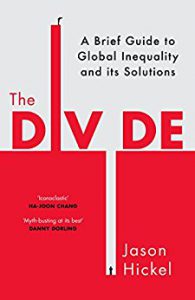 Fans of Hickel’s contributions to the Guardian newspaper will thoroughly enjoy this well-written, accessible and yet thoroughly referenced overview of international inequality (unlike too many academic texts attempting to prove their credentials, the Divide avoids tedious language and footnotes to allow the reader read).
Fans of Hickel’s contributions to the Guardian newspaper will thoroughly enjoy this well-written, accessible and yet thoroughly referenced overview of international inequality (unlike too many academic texts attempting to prove their credentials, the Divide avoids tedious language and footnotes to allow the reader read).
The book romps fairly through the origins and processes of the ‘development delusion’ with forays into colonialism, the age of the coup (now so often conveniently ignored by neo-liberal enthusiasts), debt and ‘planned misery’, the rise of ‘free trade’ and the nature of plunder in the 21st century. The concluding chapters in the Divide explore the debate on charity versus justice and finally, in a chapter entitled ‘The Necessary Madness of Imagination’, some justice-focused options for a better future.
What I liked most about Hickel’s approach is its relentless justice agenda; its ability to cut through the verbiage and PR of so much of current international development-speak; its insistence on including the perspective of the poor and relatively powerless and its ability to focus on old, established processes of plunder alongside the ‘newer’ realities – illicit financial transfers, land grabbing and ‘climate changers’ (who is actually causing climate change?). Hickel does an admirable job on summarising extensive material and debate on, for example the SDGs (p.59-61), how Britain underdeveloped Asia (p.90-93) – echoing Walter Rodney’s brilliant How Europe Underdeveloped Africa and the age of the coup (p.115-124) – there are many other examples. His language remains clear and concise (and in this case a retort to today’s Brexiteers and their imagined past):
‘While India and China watched their share of global GDP diminish, Europeans increased their own share from 20 to 60 per cent during the colonial period. Europe didn’t develop the colonies. The colonies developed Europe.’
The endnotes are a must and the list of ‘influencing authors’ a who’s who of key writers on the ‘development’ story, too many of whom are now ignored in reading lists.
The Divide is a timely reminder of the pain, misery and suffering forced on so many worldwide in the name of ‘development’ and of the need to constantly rekindle our anger and passion for what is THE key story in today’s world. As an introduction to the debate on international development and inequality, it is hard to better Hickel – The Divide deserves to be top of the current list. Without doubt, my top summer development education ‘must read’.
The Empire of Things: How We became a World of Consumers from the 15th century to the 21st by Frank Trentmann
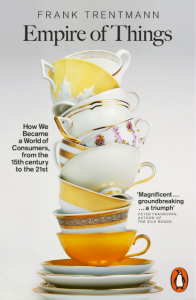 Despite weighing in at a mega 692 pages of text (the following notes are a real treat), Trentmann’s book is surprisingly easy to read with the individual chapters capable of ‘stand-alone’ treatment. It really is a must for those of us in DE who would use the crucial debates on consumerism as part of our agenda of analysis and, more importantly, action.
Despite weighing in at a mega 692 pages of text (the following notes are a real treat), Trentmann’s book is surprisingly easy to read with the individual chapters capable of ‘stand-alone’ treatment. It really is a must for those of us in DE who would use the crucial debates on consumerism as part of our agenda of analysis and, more importantly, action.
Frank Trentmann, Professor of History at Birkbeck in London has provided a sweeping and ambitious history of consumerism from medieval times to the present and, en route challenges many arguments and myths around the issue providing much evidence for the ‘for and against’ approach. The first half of Empire of Things traces the ‘global advance of goods’ in the 15th century to the re-growth of markets in Asia today with Atlantic slavery dominating much of the story. In the period 1700 to 1808, sugar (the quintessential product of British slavery) had become so profitable a commodity that the prosperity of English ‘slave ports’ (Bristol and Liverpool) was derived from sugar alone. A typical slave ship carried trading goods (beads, rifles and gunpowder) from England to Africa, then slaves from Africa to the Caribbean, and then sugar, coffee, cotton, rice and rum back to England – for Trentmann ‘a flawless loop of supply and demand’.
Two chapters I found particularly interesting were those on Home and Away (on Fairtrade – a critical assessment by Trentmann – the rediscovery of local food and the impact of migration on consumption) and Throwaway Society. On the latter, he comments:
‘For the planet, re-using glass bottles and separating food waste is a nice gesture, but it is the busy, energy hungry lives we lead at home and on the roads and in the air, that are the real threat.’
In an excellent epilogue, Trentmann calls for a more honest public debate, a keener appreciation of changes in the past and alternatives for the future and a recognition that in rich societies the most materially intensive practices are not evenly distributed.
Cue development education. There is much food for (strategic) thought in this blockbuster, we would do well to study it.
Resolving Structural Conflict: How Violent Systems Can Be Transformed by Richard Rubenstein
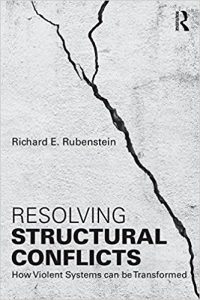 This is a book that seeks to extend traditional conflict resolution ideas and approaches into the more challenging terrain of social systems, structural conflict and how their violence can be transformed into a more positive peace. Rubenstein is University Professor of Conflict Resolution and Public Affairs at George Mason University (author of acclaimed books When Jesus Became God: The Struggle to Define Christianity during the Last Days of Rome 1999 and Reasons to Kill: Why Americans Go to War 2010) and is one of my colleagues in teaching in Malta.
This is a book that seeks to extend traditional conflict resolution ideas and approaches into the more challenging terrain of social systems, structural conflict and how their violence can be transformed into a more positive peace. Rubenstein is University Professor of Conflict Resolution and Public Affairs at George Mason University (author of acclaimed books When Jesus Became God: The Struggle to Define Christianity during the Last Days of Rome 1999 and Reasons to Kill: Why Americans Go to War 2010) and is one of my colleagues in teaching in Malta.
Resolving Structural Conflicts examines a central challenge in conflict studies: what do we do about violent conflicts that are not the result of misunderstanding, prejudice, or malice, but are instead the outcomes of a social system that routinely creates and re-creates violent conflict. Such an approach challenges traditional conflict resolution approaches (crudely stated as calling in a mediator to support the identification and negotiation of agreement) as the solution demands the restructuring of social, political, and cultural systems (precisely the traditional terrain of development educators).
Rubenstein highlights the evolution of the field of conflict resolution studies from being one concerned with ‘clashes of interest’, to one focused on ‘threats to identity’ to a third stage recognising the role of structures in generating violence. Having developed a general understanding of structural conflicts (via an analysis of the prison system, the Israeli-Gaza War of 2014 – involving an absorbing discussion of ‘partisan moralism’ (‘if our violent behaviour is to be considered justifiable, theirs must be totally blameworthy’) – and a review of concepts and ideas of conflict analysts such as Johan Galtung. There follows an extensive discussion on class and conflict (poverty and economic inequality as major sources of crime including ethnonational, racial and religious clashes), states (not just failed states) as parties to conflict; how race and ethnicity rather than inequality and racial injustice remain foremost in public debate and the ‘invisibility of class’ and how ‘social conflicts need to be defined by reference to the whole system rather than by reference to their immediate partners’.
Despite its focus, Rubenstein’s book is immediately accessible and all the times, challenging (‘conflict resolution as a supplement to state power rather than as a replacement for such power’) with much to say to development education. Consider just one of his conclusions:
‘First, most serious structural conflicts are simultaneously class-based, cultural and political…what often make them seem complex and intractable…One’s inability to transform the system as a whole is certainly no reason to avoid doing what one can – especially if there is reason to believe that a specific reform is a step toward system transformation rather than away from it.’
Resolving Structural Conflicts is a (ahem) rich read for despite its academic provenance, Rubenstein’s style and personal experience in real world situations over many years brings the activist and academic perspectives together in a deceptively easy manner.
No Is Not Enough: Defeating the New Shock Politics by Naomi Klein
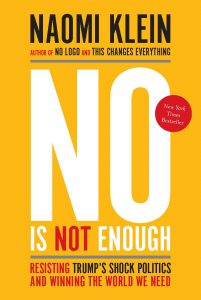 This is a book of and for our times, focused as it is on the Trump Presidency and its potential for huge impact in terms of injustice in both the US and internationally. Canadian Naomi Klein is now one of the foremost critics and opponents of current capitalist globalisation having emerged from the 1990s social movements to challenge the origins and impact of such globalisation. Klein’s hugely successful 2000 book No Logo summarised arguments and ideas current in radical circles over the previous decade. More recently, her books Shock Doctrine (2007 – a deeply shocking expose of US practice in Iraq) and This Changes Everything (2014 on climate change) have become core reference points in the literature.
This is a book of and for our times, focused as it is on the Trump Presidency and its potential for huge impact in terms of injustice in both the US and internationally. Canadian Naomi Klein is now one of the foremost critics and opponents of current capitalist globalisation having emerged from the 1990s social movements to challenge the origins and impact of such globalisation. Klein’s hugely successful 2000 book No Logo summarised arguments and ideas current in radical circles over the previous decade. More recently, her books Shock Doctrine (2007 – a deeply shocking expose of US practice in Iraq) and This Changes Everything (2014 on climate change) have become core reference points in the literature.
In this book Klein encourages readers to move from refusal to resistance, from a passive position of ideological and verbal opposition to active engagement in a programme of resistance. For Klein, waiting to see what happens is not an option as the trump regime pursues all-out war on the public sphere and the public interest:
‘it’s a program so defiantly unjust and so manifestly unjust that it can only be pulled off with the assistance of divide-and-conquer racial and sexual politics, as well as non-stop spectacle of media distractions.’
In Trump’s world, there are only winners and losers, supporters are winners, opponents losers. As in many other situations worldwide, reality is turned on its head; it is not necessary to be good or decent (the trait of losers) – all that is required is that the message remains consistent – the winners are in charge and the rules do not apply to them. National security becomes the veneer under which corporate greed and corruption flourish – 9/11 and US behaviour in Iraq post Saddam Hussein have witnessed an unheard of explosion of corporate capture of public goods or common-wealth. Political crises are market opportunities, ‘special security measures’ can be used to undermine democracy and force ‘the market’ down people’s throats. As Klein notes in chapter 8, the billionaires and multi-millionaires who have captured public politics have become ‘masters of disaster’, exploiting crises for private and corporate gain – private seizure of land and resources, bloated military spending, economic de-regulation and, of course climate change denial.
Klein documents the practices of the Trump regime personnel in Iraq, in New Orleans post Katrina, in property speculation and foreclosure and in environmental de-regulation to name but a few examples. Instability and fear become business opportunities for the rich. This is sadly captured in Trump’s armchair policy on Iraq – America ‘should have taken the oil’. As Klein comments ‘Go to war, take the oil. It’s a foreign policy of a sort’.
Despite the relentless bad news, Klein insists that there is a need to promote a positive radical alternative vision for society, not one that is often described as ‘greenwash’ – the belied that reform of the status quo will save us from the catastrophic consequences of climate change. She has little to offer piecemeal reformers in No is Not Enough – the book ends with a document entitled The Leap Manifesto (drawn up by Canadian activists in 2015), a ‘platform without a party’, which offers a powerful statement of alternative principles (rich pickings for development education activists).
To borrow Bill McKibben’s reference to climate change making activists of us all, the merging of corporate and private wealth with public politics (as exemplified in the Trump regime) does indeed make activists of us all. No Is Not Enough is a great rage inducing read and a riveting reminder of what our work is really about.
The Draughtsman by Robert Lautner
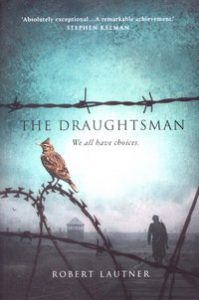 And now for something completely different, well, not really. This is an achingly beautiful book about a dilemma we all face today – speak out for the fate of millions or turn a blind eye? We all have choices.
And now for something completely different, well, not really. This is an achingly beautiful book about a dilemma we all face today – speak out for the fate of millions or turn a blind eye? We all have choices.
Ernst beck, unemployed draughtsman in Germany 1944 is offered a job working for Erfurt’s most prestigious engineering firm, Topf & Sons. This means he can finally contribute to the war effort, provide for his beautiful wife, Etta, and make his parents proud. And yes, you guessed it, there is a price which grows in cost and implications as the novel progresses. Ernst is assigned to the firm’s smallest team – the Special Ovens Department. Reporting directly to Berlin, his role is to annotate plans for new crematoria that are specifically designed to burn day and night in the SS concentration camps. The novel charts Ernst’s growing realisation that he cannot avoid the implications of his job – his choices are clear.
Lautner brilliantly charts the realities and contradictions of human nature and, page by page illustrates how complicit people can become in the face of power and fear. The characters epitomise the dilemmas and debates – his wife Etta and her examinations of conscience; his parents and their desire to simply survive daily, his colleagues in Topfs and the SS officers with whom he has contact. Lautner’s descriptive power is one of the novel’s great strengths – description of the camps, of the seasons and of daily life; of dislocation in Germany at the time, of Ernst’s love for his wife and concern for family and friends.
At the conclusion, Lautner has written an addendum linking the story to modern business life and its practices and choices. The Draughtsman is not simply about Germany 1944 but is powerfully about today. Its descriptions of refugees fleeing their country in search of safer contexts is but one parallel; the Draughtsman is nothing short of universal in its sweep and in its challenges.
A novel you simply must read…please!
Finally, an important and unashamed plug…
Coming on August 19th our good friend and colleague Omar Grech’s (University of Malta) Human Rights and the Northern Ireland Conflict: Law, Politics and Conflict, 1921-2014, Taylor and Francis (more on this next month).
- Colm Regan is co-editor of 80-20 Development in an Unequal World, 7th edition (2016) along with Tony Daly and Ciara Regan, co-published by 80:20 Educating and Acting for a Better World and the New Internationalist.

